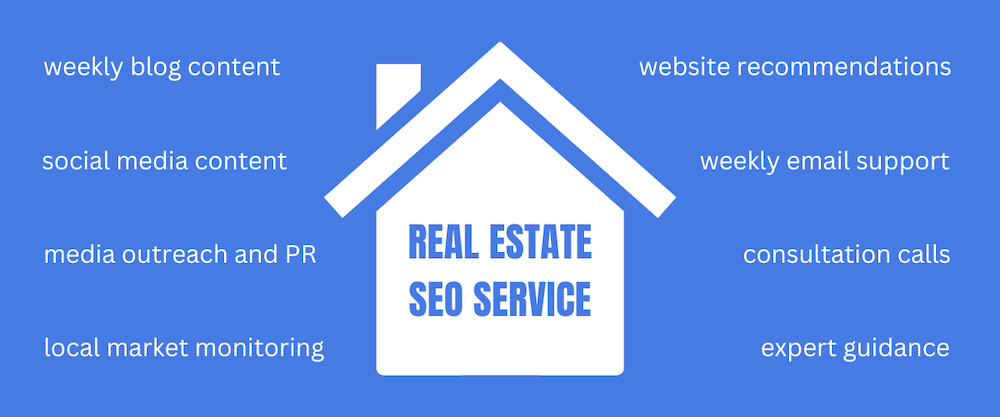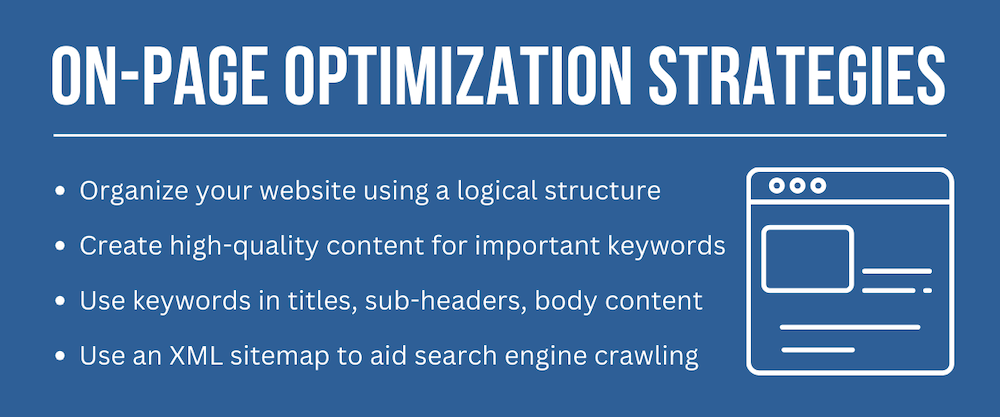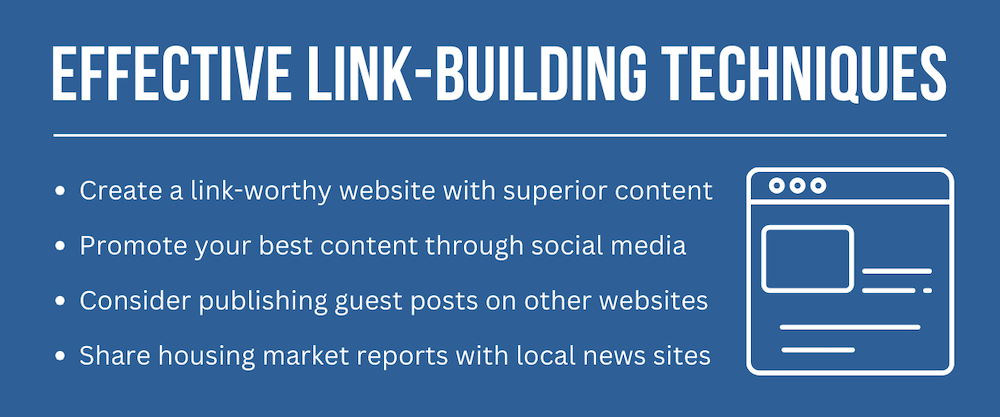Our real estate SEO services can help you increase your website traffic and search engine visibility over time—and significantly. Learn more below about what makes this service special.
Real Estate SEO and Content Services
HBI offers a unique real estate SEO service that combines audience research, content creation, blogging, social media, and public relations (PR) outreach. It’s a comprehensive and effective approach to search engine optimization you won’t find anywhere else.

Our real estate SEO package can help you increase search engine visibility and exposure within your local market, so you can generate more leads and attract more clients.
Here’s what you receive through this service:
- One premium blog post per week for traffic growth
- Social media content related to the weekly post
- One press release per month sent to local media
- Local market monitoring to support the above
- Ongoing SEO guidance and website suggestions
- Weekly email support for your marketing questions
- Monthly consultation calls for additional guidance
- Ongoing access to a real estate SEO pioneer
Note: Our standard package covers all the bases for an effective SEO strategy. But it’s also flexible. For instance, if you don’t want press releases sent to local media, we could replace that with a LinkedIn article or an additional blog post.
1. One premium blog post per week to increase traffic
High-quality content is the centerpiece of a real estate SEO strategy. And we’ve got you covered in this department.
Each week, you’ll receive a comprehensive, well-written blog post relating to your local real estate market and audience. We call it the “mega post,” because it’s designed to outshine any content published by your competitors.
All posts are more than 1,500 words in length and contain one supporting infographic. They are written with a journalistic quality, well researched, and properly optimized for search engine visibility.
(Note: We follow the best practices recommended by Google by creating helpful, reliable, and “people-first” blog content.)
2. Social media content related to the weekly post
Your weekly blog post will also include 5 – 10 social media posts you can use to share and promote the new content. You can use the social media posts as-is, or as a head start for creating your own original posts. You’ll have plenty of content, and plenty of options!
3. One press release per month sent to local media
Media outreach and PR can take your internet marketing strategy to the next level. It also supports your real estate SEO efforts, by helping you gain legitimate “backlinks” from reputable websites to your site.
Once per month, we will create and distribute a press release with a detailed update on local real estate market conditions in your area. The press release will mention you as the local market authority and link to your site so readers can learn more.
We will identify appropriate media sources that serve your city and/or metro area, including local news, TV, radio, magazines, etc.
4. Local market monitoring to support the above
The Home Buying Institute (HBI) has been monitoring and reporting on real estate market conditions for nearly 20 years. And with our real estate SEO services, we will put that research and reporting experience to work for you. We will monitor all aspects of your local real estate market, to produce superior blog content and reports that set you apart from the competition.
5. Ongoing SEO guidance and site recommendations
An effective real estate SEO strategy involves steady improvements made over time. In addition to providing you with great content, we’ll also make occasional recommendations for your website. This might include website organization, usability, linking, or other factors that can improve your search engine visibility over time.
6. Weekly email support for your marketing questions
We’ll take care of your real estate SEO needs. But you probably have questions about other aspects of real estate marketing as well. This package also entitles you to one email consultation per week, on any aspect of real estate internet marketing.
(Note: This feature refers to email inquiries that are beyond the scope of our real estate SEO services package. You can email anytime with service-related questions!)
7. Monthly consultation calls for additional guidance
Most questions and concerns can be handled via email. But in some cases, you might need in-depth answers or insights that can’t be delivered electronically. Our real estate SEO service includes one monthly consultation phone call up to 90 minutes.
8. Ongoing access to a seasoned real estate SEO expert
Through your email and phone consultations, you’ll gain insights from one of America’s leading real estate marketing experts. Brandon Cornett has been helping real estate and mortgage professionals grow their businesses for nearly 20 years. See the full bio below for details.
FAQs About Search Engine Optimization
Have questions about SEO and how it all works? We have answers! Here are some of the most common questions real estate agents ask about search engine optimization strategies:
What is real estate search engine optimization?
Search engine optimization is the process of improving a website so that it ranks well for relevant search engine queries. Real estate SEO involves topic and keyword research, website organization, content development, and promotional efforts to earn links from other websites.
What are the benefits for real estate agents?
Real estate SEO can help you bring more home buyers and sellers to your website, by improving your search engine visibility for relevant topics and phrases. But the benefits don’t end there.
- Increased organic traffic: By achieving higher rankings for relevant keywords, you can attract more potential clients to your website. This “organic” traffic often converts better than paid advertising, because search engine users are actively researching real estate topics.
- Targeted leads: Real estate SEO allows you to target specific demographics and locations with your content strategy. This means you can attract the exact type of clients you want to work with, whether it’s high-end buyers in a specific neighborhood or first-time buyers in a growing city.
- Credibility and trust: Websites appearing at the top of organic search results are typically the most authoritative and useful sites within their niche. Because of this, a real estate SEO strategy can help you establish credibility and trust among your audience, while converting more visitors into clients.
- A better website: If it’s good for people, it’s good for search engines. That’s one of our guiding principles when implementing real estate SEO. And one component of that is to have a well-organized website with plenty of useful content. These kinds of strategies can improve website usability and increase conversion rates.
- Competitive advantage: An effective real estate SEO campaign can help you stay ahead of the competition and attract more clients, compared to other agents or brokers who’ve neglected their SEO. It’s not “survival of the fittest,” but survival of the most visible.
- Long-term benefits: With paid advertising, the traffic and visibility disappear the moment you stop paying for it. In contrast, the benefits of real estate SEO continue to grow over time, even if you temporarily stop investing in it. This makes search engine optimization a valuable long-term investment.
How does real estate SEO actually work?
An effective real estate SEO campaign involves three main fundamentals:
- You have to identify relevant keywords used by your target audience and create high-quality content around those topics.
- Next, you’ll need to create a well-organized website to help people and search engines find all of that great content.
- And third, you want to gradually attract links from other websites back to yours, in order to boost your “domain authority” over time.
There are some technical aspects as well, including things like sitemaps, title tags, and internal linking. But the three concepts mentioned above make up the bulk of a real estate SEO strategy.
How do I optimize my website for search engines?
According to the Merriam-Webster dictionary: “The meaning of optimize is to make as perfect, effective, or functional as possible.” This definition applies to search engine optimization as well. You are trying to make your website as “perfect, effective, and functional” as possible, in order to improve your search engine visibility over time.

You can do this by creating a well-organized website with a logical structure, interlinking between relevant pages, incorporating relevant keywords in all the right places, using a sitemap to help search engines find your content, and other strategies.
What’s the difference between on- and off-page SEO?
Real estate SEO techniques are often classified into one of two categories: on-page and off-page.
When you make improvements to your website structure or publish a new blog post, you are practicing on-page (or on-site) search engine optimization. When you take certain actions to earn links from other websites to your site, you’re using off-page (or off-site) SEO.
Here’s another way to think of it:
- On-page SEO refers to the optimization strategies applied directly to your website or individual web pages. This includes elements like content, meta tags, headings, URL structure, and internal linking.
- Off-page SEO involves activities that take place outside your website but still affect its visibility. This includes building quality backlinks from reputable sites, social media marketing, etc. Off-page SEO helps establish your website’s authority and credibility in the eyes of search engines.
Note: Our real estate SEO services combine both of these strategies to help you maximize your search engine visibility over time.
What keywords should I use on my website?
Keyword research creates a structure and framework for your real estate SEO content strategy. You want to choose keywords that will bring local home buyers or sellers to your website, since those are the people who need your services.
Think about the kinds of questions you might receive from your target audience. Think about their primary concerns and topics of interest. Home price trends, neighborhoods, real estate market updates and predictions—these are all good keyword topics for a real estate SEO content strategy.
How do I get links to my real estate website?
Acquiring links from other websites to your site can improve its “authority” and search engine rankings. This is often what separates top-ranking real estate websites from those that get buried deep down in the search results.

You can earn backlinks to your website in a number of ways:
- Publish high-quality, original content (like a detailed and comprehensive housing market report) that naturally attracts links from other publishers.
- Create visually appealing infographics related to local real estate trends, market statistics, and the like. Visual content tends to be more shareable, increasing the chance that you’ll earn some new backlinks for your work.
- Promote your best content through social media to further extend the effects.
- Submit “guest posts” to relevant websites that accept them, with an author’s bio that links back to your site.
- Share press releases or news reports with your local media outlets, with an updated look at the local real estate market. Make their jobs easier and earn some exposure.
Avoid purchasing backlinks or engaging in manipulative techniques like “reciprocal” link networks. These techniques are frowned upon by the search engines and can actually trigger a penalty that hurts your performance.
Have questions about our real estate SEO services, or anything else covered in this article? Just send an email to editor@homebuyinginstitute.com and we’ll get back to you ASAP.